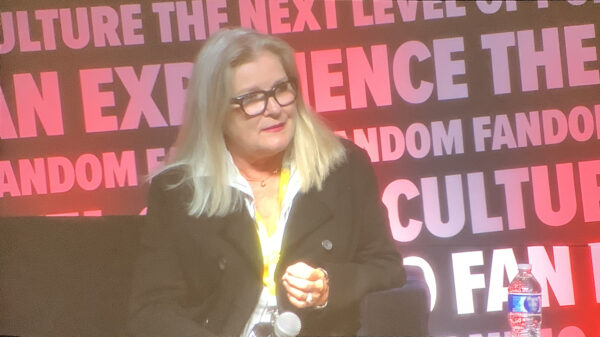While at Fan Expo Boston on Saturday, 16 June 2024, Kate Mulgrew spoke of the exhilaration and challenges of working on Star Trek: Voyager.
When asked which role she has played as an actress has changed her the most, she didn’t hesitate.
“Are you kidding? [Capatin] Janeway changed my life utterly, certainly as an actress. It was life-altering in many ways. As a professional in this industry, it was monumental. It also changed the way I lived. It changed a little bit my relationships with my children, who were no fond of their mother’s absence for seven years – but their mother was very fond of what she was doing. So, if I could go back in time and change anything, I would say we need to find a way to make this culture, this society, not only support, but endorse heartily and with action, mothers in the workplace to set the best example for our children and especially for our sons, who, as you know, can sometimes be rather difficult.”
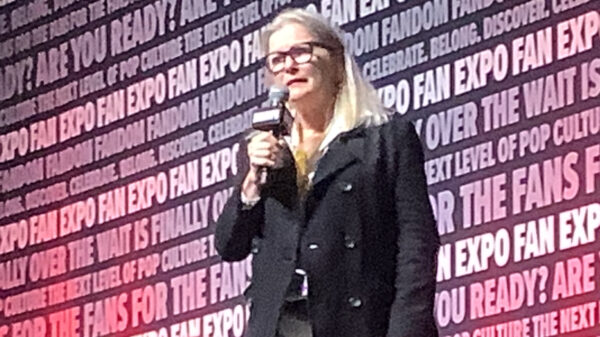
Mulgrew was then asked what it means to her to have given life to a character that has such a long-ranging and profound impact on society.
“How does it feel? I’ll have to think about this. It’s extraordinary! I mean, there’s a room full of well-known personalities in here. But I don’t know anybody in that room who’s had the privilege and the honour of affecting, and dare I say, impacting young women in the field of STEM as much as Captain Janeway. So no other single thing could be as gratifying. I was not aware of it until then first lady [Hilary] Clinton invited me to the White house to speak to women in science after the first season [of Star Trek: Voyager]. Can you imagine? Women in science. She called them from all over the world. ‘Oh, Kate, we think it would be wonderful if you could come because you’re so interesting on Star Trek: Voyager. You are the first starship captain and you will speak to the future scientists, female scientists of the world.’ ‘Yes,’ I said, gulping. I got on the plane, and in that four-hour ride from LA to Washington, wrote what I thought was a wonderful speech, dazzling speech, scintillating, powerful! I got up on the stage in the White House and they were all there, these women, and I just looked at my speech and picked it up and I threw it away. I said, ‘Why don’t you tell me what it is that I have done for you in any conceivable way that has lifted you up.’ And a girl lifter her hand, and she couldn’t have been more than twenty-five, and she said, ‘I come from a family of scientists and my father said to me, ‘Now listen, Alissa, you’re going to be very good in research. You’re going to be very good at the desk, but you’re never going to go up.’ And then you appeared on Star Trek: Voyager, and guess what? After seven years sitting by my father’s side and watching Captain Janeway on Star Trek: Voyager, I went up.’ I’ll never forget it until the day I die. Extraordinary. So you ask me if it’s gratifying. It’s beyond gratifying.”
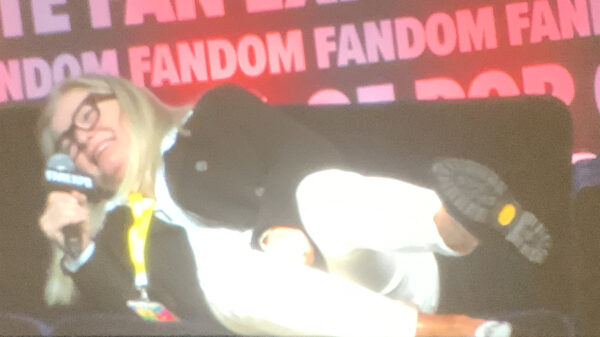
She was asked about the most challenging aspect about working in Star Trek: Voyager and revealed it was utterly challenging in every way.
“The most challenging port of working on a sound stage eighteen hours a day for seven years, raising two boys by myself? At 2:00 or 3:00 in the morning getting through the fax machine revisions that I had to learn my 5:30am – every night? And going in and wanting to do my very, very best? It was completely challenging. But here’s the kicker; I loved it. So that must be something in me because, when I’d hear that fax machine (it would wake me up at 2:00 or 3:00 in the morning), I knew and I leaped out of bed and it got the sides. Sometimes five, ten pages and I’d learn it, learn it learn it and I’d go in cold the next day, have it down. I loved that. The challenge of meeting her. The challenge of showing those gentlemen, of whom there were many, both the brass and the creatives of Paramount, that a woman could do it. I think that they were highly uncertain after [Geneviève] Bujold [who was originally cast as Captain Janeway] defected, that I could pull it off. So I was absolute. And once they left my body and my hair alone, I assumed command. I said, ‘Stop it with my bosoms. Stop it with my hair. Stop it with the boots. Stop it. Stop it!’ Right? I have to, I have to, be able to assume a command that is natural enough, organic enough, to compel the demographic that was most sought after, which were men 20 to 45, to come to me as a captain.”
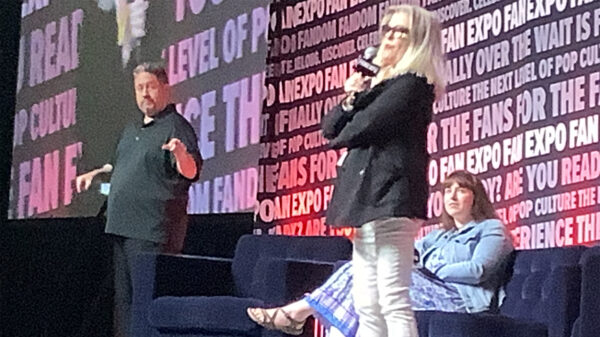
Mulgrew elaborated on the scrutiny she received from Paramount studio executives.
“The nonsense they were trying to introduce by constantly fooling around with my physicality represented to me their anxiety was very high about money. So I went to them and I said, ‘Leave me alone. Do you think men are idiots? Do you think men can’t see that the bun of steel has to come down?’ What the hell is [Janeway] doing with her time? She’s supposed to be captaining a ship! She’s changing her hairdo. She’s changing her outfit. She’s changing her attitude. She’s a girl. She’s a girl, she’s a girl! Leave me alone and the men will come. And that’s exactly what happened. And they couldn’t figure it out because I was a woman, right? And men don’t really think that way. They were used to [Patrick Stewart, Captain] Picard and before that they were used to [William] Shatner [Captain Kirk] and they had [Captain Sisko, Avery] Brooks – very good captains. All of them very good, very strong and then, suddenly, there’s a woman. What. The. Hell. And I know you all thought that, right? So they used to stand , those guys, those Paramount guys, the brass, they used to stand at the bridge, the lip of the bridge, like this (stands with arms crossed) and watch me – just watch me. Hoping for what? I don’t know. I suspect maybe there was somebody in the wings. And every time I saw them. I said to myself, ‘I’m gonna win. I’m gonna win.’”
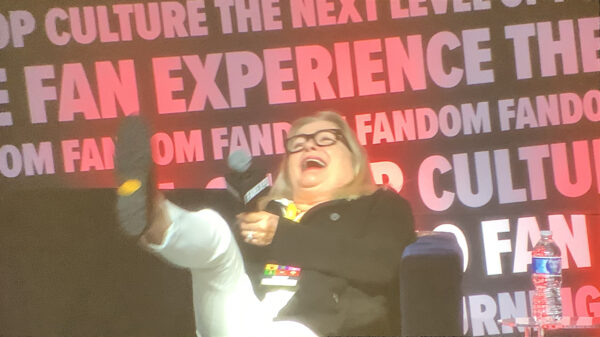
Mulgrew, herself, made a choice that Captain Janeway would remain single due to her devotion to her crew and their mission to return home.
“They did one episode [Night] on the Captain’s loneliness. It didn’t seem to have much traction but I though they should have explored that throughout the run. I [as Captain Janeway] gave up my life as a young woman. I gave up the chance to have children. I had to break up with my fiancé who quickly remarried. I had to say, ‘goodbye’ to my dog. As captain, I could love, but only to a certain extent. And Janeway chose not to have a lover. I chose. Kate Mulgrew chose not to do that. So the loneliness was harrowing. And I think it should have been a bit better revealed just under the surface of her absolute devotion to this crew and her passion for science and for exploration. But you have to show the person, you know? I suppose they were a little afraid that would be a little feminine or something, right? ‘Oh, she’s lonely.’ But I think that it’s crucial because I think women doing new things and brave things and bold things and unprecedented things are often lonely.”
She ended her time on the panel with these final words.
“Anyway, we are lonely in life and the only thing we can do is choose to be the best we can be under the circumstances. So I gave Janeway everything I had.”

